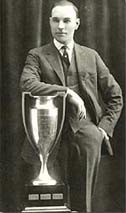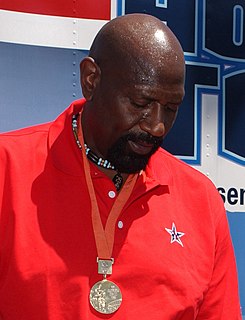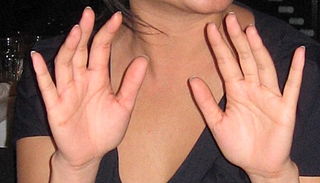See also
- One-and-done rule, basketball rule whereby players are eligible for the NBA draft after playing in college for one year
One and done may refer to:

Basketball is a team sport in which two teams, most commonly of five players each, opposing one another on a rectangular court, compete with the primary objective of shooting a basketball through the defender's hoop (a basket 18 inches in diameter mounted 10 feet high to a backboard at each end of the court, while preventing the opposing team from shooting through their own hoop. A field goal is worth two points, unless made from behind the three-point line, when it is worth three. After a foul, timed play stops and the player fouled or designated to shoot a technical foul is given one, two or three one-point free throws. The team with the most points at the end of the game wins, but if regulation play expires with the score tied, an additional period of play is mandated.

The American Basketball Association (ABA) was a major men's professional basketball league from 1967 to 1976. The ABA ceased to exist with the American Basketball Association–National Basketball Association merger in 1976, leading to four ABA teams joining the National Basketball Association (NBA) and to the introduction of the 3-point shot in the NBA in 1979.

James Naismith was a Canadian-American physical educator, physician, Christian chaplain, sports coach, and inventor of the game of basketball. After moving to the United States, he wrote the original basketball rule book and founded the University of Kansas basketball program. Naismith lived to see basketball adopted as an Olympic demonstration sport in 1904 and as an official event at the 1936 Summer Olympics in Berlin, as well as the birth of the National Invitation Tournament (1938) and the NCAA Tournament (1939).

In team sports, a most valuable player award, abbreviated 'MVP award', is an honor typically bestowed upon an individual whose individual performance is the greatest in an entire league, for a particular competition, or on a specific team. The purpose of the award is recognize the contribution of the individual's efforts amongst a group effort, and to highlight the excellence, exemplariness, and/or outstandingness of a player's performance amidst the performance of their peers in question.

In United States colleges, top-tier basketball is governed by collegiate athletic bodies including National Collegiate Athletic Association (NCAA), the National Association of Intercollegiate Athletics (NAIA), the United States Collegiate Athletic Association (USCAA), the National Junior College Athletic Association (NJCAA), and the National Christian College Athletic Association (NCCAA). Each of these various organizations is subdivided into one to three divisions, based on the number and level of scholarships that may be provided to the athletes.
The NBA draft is an annual event dating back to 1947 in which the teams from the National Basketball Association (NBA) can draft players who are eligible and wish to join the league. These are typically college basketball players, but international players are also eligible to be drafted. College players who have finished their four-year college eligibility are automatically eligible for selection, while the underclassmen have to declare their eligibility and give up their remaining college eligibility. International players who are at least 22 years old are automatically eligible for selection, while the players younger than 22 have to declare their eligibility. Players who are not automatically eligible but have declared their eligibility are often called "early-entrants" or "early-entry candidates".

In basketball, free throws or foul shots are unopposed attempts to score points by shooting from behind the free-throw line, a line situated at the end of the restricted area. Free throws are generally awarded after a foul on the shooter by the opposing team, analogous to penalty shots in other team sports. Free throws are also awarded in other situations, including technical fouls, and when the fouling team has entered the bonus/penalty situation. Also, depending on the situation, a player may be awarded between one and three free throws. Each successful free throw is worth one point.

Spencer Haywood is an American former professional basketball player and Olympic gold medalist. Haywood is a member of the Naismith Memorial Basketball Hall of Fame, being inducted in 2015.
The NBA high school draftees are players who have been drafted to the National Basketball Association (NBA) straight out of high school. The process of jumping directly from high school to the professional level is also known as going prep-to-pro. Since 2006, the practice of drafting high school players has been prohibited by the new collective bargaining agreement, which requires that players who enter the draft be 19 years of age or older and at least one year removed from high school.

"Never have I ever", also known as "I've never..." or "ten fingers", is a drinking game in which players take turns asking other players about things they have not done. Other players who have done this thing respond by taking a drink. A version that requires no drinking, usually played by children and underage adolescents, has players counting scores on their fingers instead.
Frank Williams may refer to:
In sports, dribbling is maneuvering a ball by one player while moving in a given direction, avoiding defenders' attempts to intercept the ball. A successful dribble will bring the ball past defenders legally and create opportunities to score.

This glossary of basketball terms is a list of definitions of terms used in the game of basketball. Like any other major sport, basketball features its own extensive vocabulary of unique words and phrases used by players, coaches, sports journalists, commentators, and fans.
Variations of basketball are games or activities based on, or similar in origin to, the game of basketball, in which the player utilizes common basketball skills. Some are essentially identical to basketball, with only minor rules changes, while others are more distant and arguably not simple variations but distinct games. Other variations include children's games, contests or activities intended to help the player practice or reinforce skills, which may or may not have a competitive aspect. Most of the variations are played in informal settings, without the presence of referees or other officials and sometimes without strict adherence to official game rules.

In college athletics in the United States, recruiting is the process in which college coaches add prospective student athletes to their roster each off-season. This process typically culminates in a coach extending an athletic scholarship offer to a player who is about to be a junior in high school or higher. There are instances, mostly at lower division universities, where no athletic scholarship can be awarded and where the player pays for tuition, housing, and textbook costs out of pocket or from financial aid. During this recruiting process, schools must comply with rules that define who may be involved in the recruiting process, when recruiting may occur and the conditions under which recruiting may be conducted. Recruiting rules seek, as much as possible, to control intrusions into the lives of prospective student-athletes. The NCAA defines recruiting as “any solicitation of prospective student-athletes or their parents by an institutional staff member or by a representative of the institution’s athletics interests for the purpose of securing a prospective student-athlete’s enrollment and ultimate participation in the institution’s intercollegiate athletics program."

The three seconds rule requires that in basketball, a player shall not remain in their team's foul lane for more than three consecutive seconds while that player's team is in control of a live ball in the frontcourt and the game clock is running. The countdown starts when one foot enters the restricted area and resets when both feet leave the area.
Jim or Jimmy Taylor may refer to:

Basketball began with its invention in 1891 in Springfield, Massachusetts, by Canadian physical education instructor James Naismith as a less injury-prone sport than football. Naismith was a 31-year old graduate student when he created the indoor sport to keep athletes indoors during the winters. The game became established fairly quickly and grew very popular as the 20th century progressed, first in America and then in other parts of the world. After basketball became established in American colleges, the professional game followed. The American National Basketball Association (NBA), established in 1946, grew to a multibillion-dollar enterprise by the end of the century, and basketball became an integral part of American culture.
The NBA draft is a major annual event in which the 30 franchises in the National Basketball Association select new players for their teams. Eligibility rules for prospective players have changed several times during the history of the league. No player may sign with the NBA until they are 19 years or older. Players who have played at least one year of college basketball are eligible for the NBA draft; this has been colloquially called the one-and-done rule, with such players called "one-and-done players".
Basketball is a ball game and team sport in which two teams of five players try to score points by throwing or "shooting" a ball through the top of a basketball hoop while following a set of rules. Since being developed by James Naismith as a non-contact game that almost anyone can play, basketball has undergone many different rule variations, eventually evolving into the NBA-style game known today. Basketball is one of the most popular and widely viewed sports in the world.